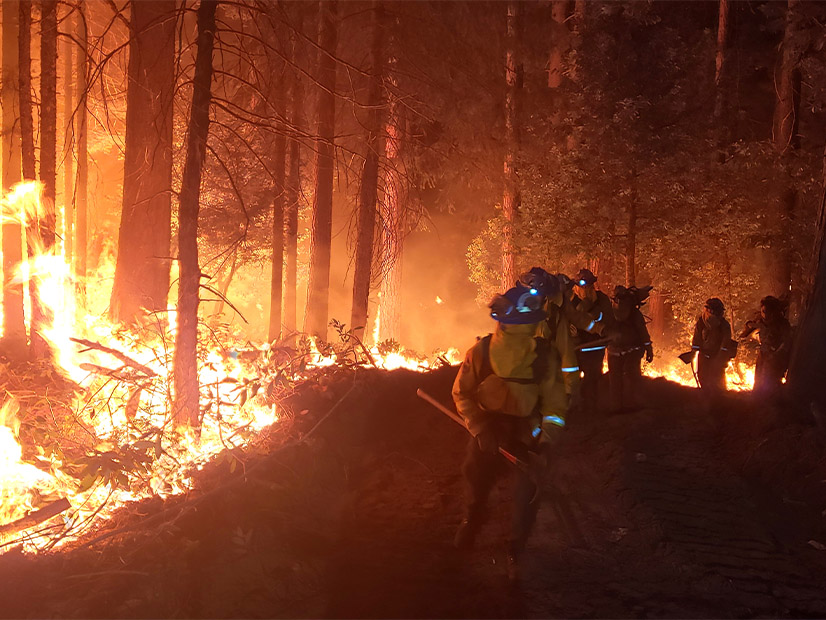
FERC on Oct. 8 granted and denied in part challenges to Pacific Gas and Electric’s 2022 transmission rates, finding that PG&E must remove certain costs from its rate base while also denying a request to pause the utility’s ability to recover costs stemming from two massive fires in California.
The order concerns PG&E’s rate year 2022 information filing, which reflected increased costs in both retail and wholesale base transmission revenue requirements (TRRs) (ER19-13).
The utility reported that its retail base TRR would increase from approximately $2.214 billion to $2.812 billion, while its wholesale base TRR would rise from about $2.202 billion to $2.799 billion.
The California Public Utilities Commission and the California cities of Anaheim, Azusa, Banning, Colton, Pasadena and Riverside challenged the update. FERC handed wins to both sides in its decision while also scheduling some issues for hearing and settlement judge procedures, according to the order.
In siding with the challengers, FERC found that PG&E cannot claim that its vegetation management, such as tree removal, is similar to initial construction activities, which would have allowed PG&E to tack those costs onto its rate base. Instead, FERC ordered PG&E to reclassify such costs as operating and maintenance expenses and remove the costs from its rate base.
“PG&E has not demonstrated that tree removal associated with its [right of way] expansion qualifies as a substantial addition to plant nor a construction of a new asset, and accordingly, PG&E must record such costs in the appropriate O&M expense account,” the order stated.
However, FERC denied CPUC’s request for an order requiring PG&E to remove costs related to the 2019 Kincade Fire and the 2020 Zogg Fire. The devastating fires burned thousands of acres and destroyed hundreds of buildings in Northern California, and CPUC has hit PG&E with severe penalties over the utility’s alleged role in those fires and others. (See CPUC Fines PG&E $45M for 2021 Dixie Fire.)
In its 2022 challenge, CPUC asked FERC to avoid holding ratepayers responsible for the wildfire recovery costs until liability had been determined in various pending investigations and regulatory proceedings, according to the order.
FERC denied the challenge in the Oct. 8 order, finding that it rejected a similar challenge in San Diego Gas & Electric’s formula rate annual update in 2016.
“Consistent with this precedent, we are not persuaded to hold the allowance of costs at issue in this proceeding in abeyance pending resolution of the state criminal, investigatory and regulatory proceedings,” the order stated. “As in the SDG&E proceeding, the ongoing and potential state proceedings CPUC describes could take significant time to resolve, meaning that this proceeding would ‘be held in abeyance for an indefinite period of time.”’
FERC noted that its order “does not limit any party’s right to challenge the justness and reasonableness of the allowance of costs associated with the Kincade and Zogg fires in subsequent PG&E annual informational filings, including by pointing the commission to any relevant information that may emerge from state proceedings regarding the Kincade and Zogg fires.”
Additionally, FERC rejected challenges to PG&E’s accounting of costs related to upgrades to transmission towers, monitoring systems and a boardwalk replacement program.
CPUC also targeted insurance proceeds, wildfire-related costs and costs associated with removing the PG&E-operated Caribou-Palermo transmission line, which failed in 2018, resulting in the Camp Fire, one of the deadliest in California’s history. (See Ancient C Hook, Financial Manipulation Caused Camp Fire.)
Similarly, CPUC argued that ratepayers should not bear the burden of reconnecting the Grizzly Powerhouse, a hydropower project, to the transmission grid, saying that “would not be necessary but for the Camp Fire,” according to the order.
However, FERC declined to take a position on those challenges, finding that the matters “raise issues of material fact that cannot be resolved based on the record before us.” Instead, the commission sent the matters for a trial-type evidentiary hearing but encouraged the parties to reach a settlement before hearing procedures commence.
Representatives for the parties did not return requests for comment.



